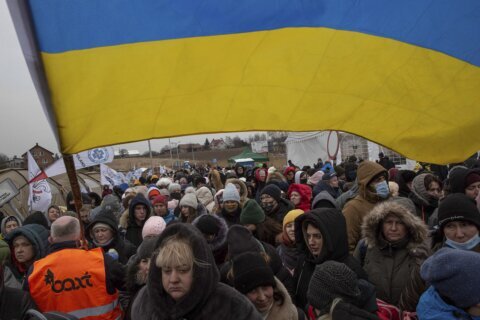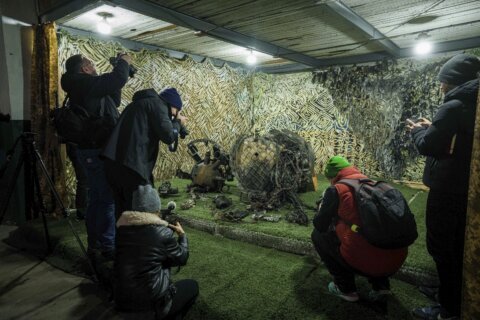VILLEPINTE, France (AP) — For Ukrainian volleyball player and infantry officer Dmytro Melnyk, coming to Paris to compete at the Paralympic Games has come at a cost. He had to leave behind his platoon of 35 soldiers on the front lines of the war against Russia. Unable to call them for news because “they’re in the middle of hell” and unreachable from France, he says all he can do is hope there will still be 35 of them when he gets back.
Such is the heart-wrench for Ukraine’s delegation of 141 athletes who are trying to remain focused on the chase for medals even as the Russian onslaught on their country means their minds are often elsewhere. Some tell themselves that they are doing their bit for the national cause by keeping Ukraine in the news with their sporting exploits. But it also quickly becomes apparent that the agonies of war came with them in their baggage.
As Melnyk told reporters his story Friday after his volleyball team’s opening match, his translator from the Ukrainian delegation broke down into tears. He’d been asked how many men and women he has under his command and his response, although delivered matter-of-factly, proved to be too bone-chilling for the translator whose overflow of emotion showed the war’s painful rawness for those trying to survive it.
“Thank God I don’t have women under my command. Not because they’re bad at fighting, but because it’s very scary to let women go into a place where there’s a high probability that you’re going to get killed,” Melnyk said.
The 45-year-old said he came off the front line on Aug. 18 — just 10 days before the Paralympics opened. He said his men are in Chasiv Yar, a city in eastern Ukraine that Ukrainian forces have for months been defending against Russian attempts to capture it.
“Before I came here I had a platoon of 35 men under my command. I sure hope that’s how many are left. I haven’t called anyone, and there’s no communication there, because they’re in the middle of hell,” Melnyk said. “Let’s just assume there are still 35 of them.”
Melnyk is a Paralympic veteran. His left leg was injured in an accident when he was 18 and is a few centimeters (two or three inches) shorter than the right one. When standing, his left foot is on tiptoes while his right one is flat on the floor. At the Paralympics, he competes in sitting volleyball and was also on the Ukraine team that finished 5th at the 2016 Games in Rio de Janeiro.
Convincing the Ukrainian military that he could help in the fight against Russia’s full-scale invasion, now in its third year, “was very hard,” he said. It involved eight months of “constant visits” to army draft centers and “a little bit of trickery,” he said. Melnyk didn’t elaborate but joked that when he’s with the troops he pretends that he limps because his boots are too tight. He said he served as a drone operator before becoming an infantry officer.
But the Paralympic volleyball team is “my second family,” Melnyk said. “I have been doing this sport for about 20 years. I simply have no right to let my team down.”
Teammate Yevhenii Korinets was thrilled that commanders allowed Melnyk to join them in Paris.
“It’s really difficult for him because serving in the army is 24/7 work,” he said, speaking through the translator. “You’re always in stress because of constant bombings and constant risky situations to your own life and it’s a big achievement for us and for Dmytro to be here.”
“We’re really proud to share this moment together with him,” he said.
Korinets, 27, also served in the war. He was severely injured by a mine blast, losing his left leg, in March 2023 during a ferocious months-long battle for another city in eastern Ukraine, Bakhmut.
A physiotherapist before the war, he signed up to fight when Russia launched the full-scale invasion in February 2022 and later became a military paramedic.
“I just couldn’t sit at home,” he said.
He said he’d sign up again if he could.
“I really want to,” he said. “If it was possible to bring back my leg, I would do that one more time for my country.”
Ukraine’s first group-stage match didn’t go its way. It lost in three straight sets to Iran.
In the war, Russia has massively used Iranian drones to hit Ukrainian population centers and infrastructure. Korinets said he didn’t want to comment when asked whether the volleyball game had felt like a grudge match to him and the team. The players shook hands afterward.
Still, simply by turning up in Paris in the midst of their fight for survival, the Ukrainians showed that they’re not beaten.
“I have a message to the world: Don’t be afraid, never be afraid of anyone, especially of terrorists and murderers,” Melnyk said. “The more we are afraid, the more people will die. And unfortunately not only in Ukraine. Everyone should realize this.”
__
Associated Press journalists Volodymyr Yurchuk and Yehor Konovalov in Kyiv, Ukraine, contributed.
___
AP Paralympics: https://apnews.com/hub/paralympic-games
Copyright © 2024 The Associated Press. All rights reserved. This material may not be published, broadcast, written or redistributed.







